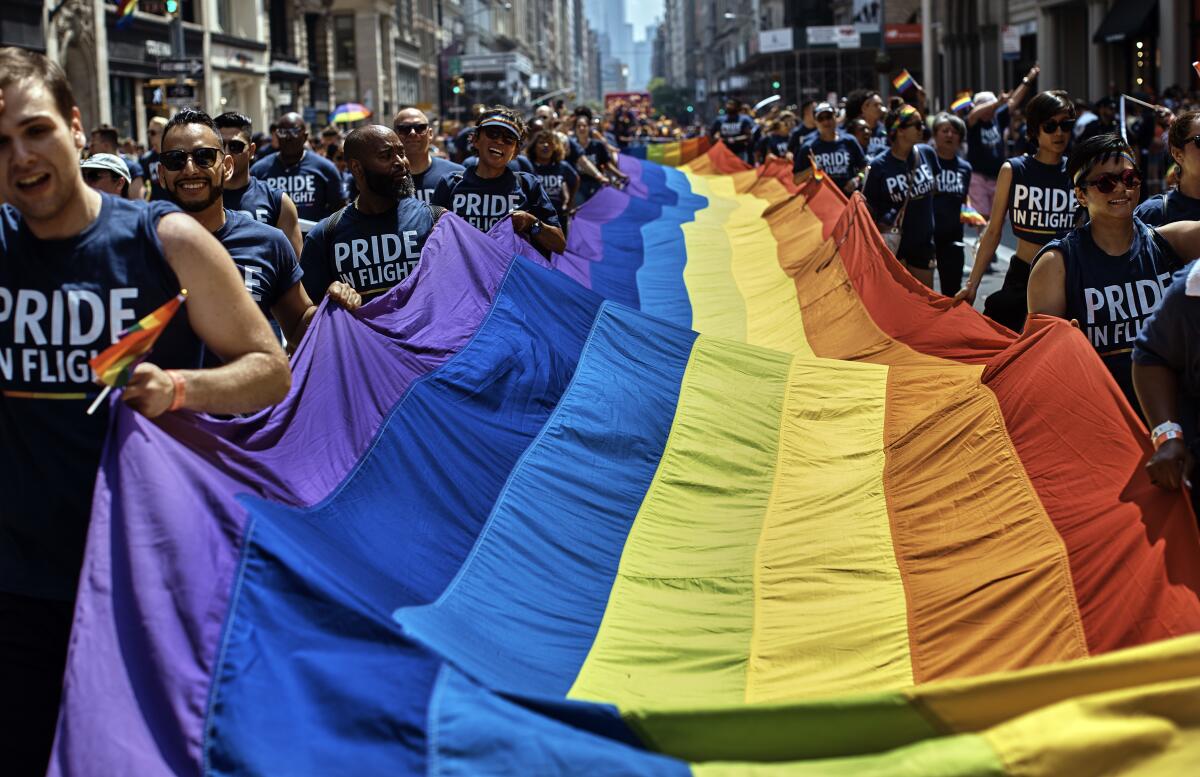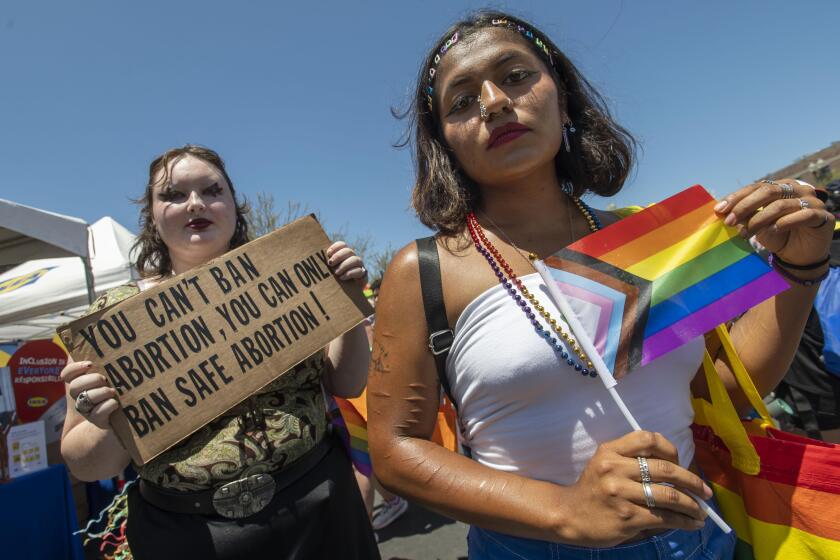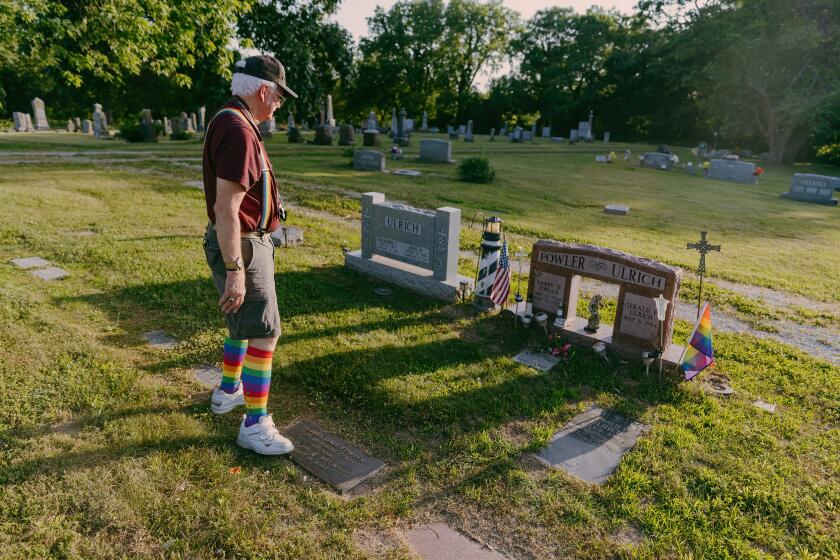Fearful after abortion ruling, many LGBTQ couples are updating their legal status

BIRMINGHAM, Ala. — Emails and phone calls from same-sex couples, worried about the legal status of their marriages and keeping their children, flooded attorney Sydney Duncan’s office within hours of the Supreme Court’s decision eliminating the constitutional right to abortion.
The ruling last week didn’t directly affect the 2015 decision that paved the way for same-sex marriage. But, Duncan said, it was still a warning shot for families headed by same-sex parents who fear that their rights could evaporate like those of women seeking to end a pregnancy.
“That has a lot of people scared and, I think, rightfully so,” said Duncan, who specializes in representing members of the LGBTQ community at the Magic City Legal Center in Birmingham, Ala.
Many LGBTQ couples, fearful that their marital status is in danger, are moving now to square away potential medical, parental and estate issues.
Dawn Betts-Green and her wife, Anna Green, didn’t waste time shoring up their legal paperwork after the Supreme Court decision to overturn Roe vs. Wade. They’ve already visited a legal clinic for same-sex families to start the process of making a will.
“That way, if they blast us back to the Dark Ages again, we have legal protections for our relationship,” said Betts-Green, who works with an Alabama-based nonprofit that documents the history of LGBTQ people in the South.
Many fear LGBTQ rights will be the Supreme Court’s next target
In Minneapolis, Robbin Reed feels particularly vulnerable as a white woman married to a Black transgender man. A decision undermining same-sex marriage or interracial unions would upend Reed’s life, as well as that of the couple’s 3-month-old child.
“I have no expectation that anything about my marriage is safe,” said Reed, a legal aide.
Reed’s employer, Sarah Breiner of Breiner Law Firm, is setting up seminars in the Twin Cities and the Atlanta area to help same-sex couples navigate potential legal needs after the court’s decision. Breiner said helping people remain calm about the future is part of her job these days.
“We don’t know what might happen, and that’s the problem,” Breiner said.
He may not be recognized at Pride events nationwide, but Gene Ulrich set an LGBTQ first when he was elected mayor of a Missouri town in 1980.
In the ruling on abortion rights, Supreme Court Justice Samuel A. Alito Jr. wrote that the decision addressed abortion only and that “nothing in this opinion should be understood to cast doubt on precedents that do not concern abortion.”
But his fellow conservative justice Clarence Thomas called on the court to reconsider cases that allowed same-sex marriage, gay sex and contraception. And the court’s three most liberal members warned in their dissent that the ruling could indeed be used to challenge other personal freedoms: “Either the mass of the majority’s opinion is hypocrisy, or additional constitutional rights are under threat. It is one or the other.”
In a sign of what could come, Alabama already has cited the abortion ruling in asking a federal appeals court to let it enforce a new state law that makes it a felony for doctors to prescribe puberty blockers and hormones to trans people younger than 19. The decision giving states the power to restrict abortion means states should also be able to ban medical treatments for transgender youths, the state said.
Any attempt to undo marriage equality would begin with a lawsuit, and any possible rollback is years away because no major legal threat is on the horizon, said Cathryn Oakley, senior counsel and state legislative director with the Washington-based Human Rights Campaign, an LGBTQ advocacy organization.
Breaking News
Get breaking news, investigations, analysis and more signature journalism from the Los Angeles Times in your inbox.
You may occasionally receive promotional content from the Los Angeles Times.
“This is definitely a scary moment and people are nervous, but people’s marriages are still safe,” Oakley said.
Although the threat to same-sex couples feels particularly acute in conservative states, Oakley said she’s heard of people all over the country in recent days seeking second-parent adoptions, which protect a family by having the names of both adoptive parents on the birth certificate. People also are completing medical directives in case one spouse is incapacitated, and doing general estate planning, she said.
Ryanne Seyba’s law firm in Hollywood, Fla., is offering free advice and help on second-parent adoptions, which are similar to stepparent adoptions, for qualified same-sex couples to help ease some of the stress caused by the possible ripple effects of the abortion decision.
“We realized last week when [the ruling] came out we needed to do something,” Seyba said.
A judge in Broward County plans to have a special day in August to finalize all the adoptions at once, Seyba said. If nothing else, completing the process should give nervous families more security, she said.
“If gay marriage goes away, we don’t really know what’s going to happen,” she said. “It’s better to be on the safe side.’’
More to Read
Sign up for Essential California
The most important California stories and recommendations in your inbox every morning.
You may occasionally receive promotional content from the Los Angeles Times.












